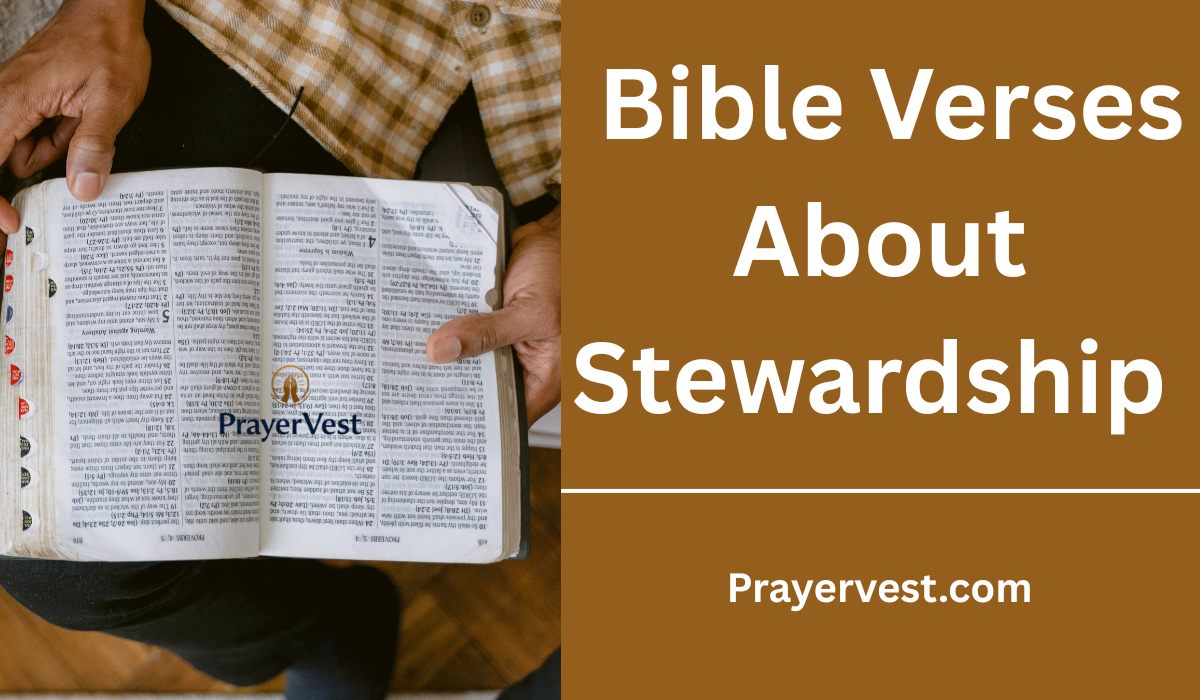A major motif in Scripture is stewardship, which serves as a reminder that all we own, including our time, abilities, resources, and even our lives, ultimately belongs to God. According to what the Bible says, we are entrusted with God’s blessings and are not their owners.
Stewardship shows our duty to handle God’s gifts sensibly and for His glory, from the Garden of Eden, where Adam was commanded to care for and preserve what God created, to Jesus’ parables, which place an emphasis on accountability and faithful service.
Biblical stewardship includes all facets of life, not just monetary contributions. The essence of stewardship is reflected in how we spend our time, how we treat creation, how we utilize our money, and how we serve others. Scripture demonstrates how being dependable in the little things gets us trusted with bigger tasks.
It also serves as a reminder that genuine stewardship is about promoting God’s kingdom, being kind, and being humble rather than about accumulating wealth for one’s own benefit.


Bible passages about stewardship provide us with instructions on how to live faithfully and responsibly with the things that God has entrusted to our care. These verses encourage us to live with an everlasting perspective, knowing that we will eventually be asked to explain how we handled the things that God had entrusted to us. They push us to use our resources for mission, service, and other people’s well-being rather than just our own comfort. Stewardship is ultimately an act of worship, expressing thanks to God for His abundant provision.
40 Inspiring Bible Verses About Stewardship (2026)
1. Genesis 2:15
“The Lord God took the man and put him in the Garden of Eden to work it and take care of it.”
From the very beginning, God entrusted humanity with the responsibility of stewardship. Adam was given the task of cultivating and protecting the garden, showing that stewardship is not just about possession but about responsibility. This verse highlights that everything we have belongs to God, and we are caretakers called to nurture, preserve, and manage His creation. True stewardship requires diligence, responsibility, and a heart aligned with God’s purposes.
2. Leviticus 25:23
“The land must not be sold permanently, because the land is mine and you reside in my land as foreigners and strangers.”
This verse reminds us that everything ultimately belongs to God, including the land and resources we use. Israel was instructed to treat the land with reverence, acknowledging God’s ownership. As stewards, we are reminded that we are temporary caretakers of the blessings entrusted to us. Whether it is land, wealth, or talents, stewardship requires humility and faithfulness in managing resources that do not ultimately belong to us but to the Lord.
3. Psalm 24:1
“The earth is the Lord’s, and everything in it, the world, and all who live in it.”
This verse establishes the foundation of stewardship: ownership belongs to God. Everything in the world—our possessions, resources, even our very lives—is under His authority. We are not owners but managers entrusted with God’s creation. Recognizing this truth changes how we handle wealth, time, and responsibilities. When we see God as the rightful owner, our stewardship becomes an act of worship and obedience.
4. Proverbs 3:9-10
“Honor the Lord with your wealth, with the firstfruits of all your crops; then your barns will be filled to overflowing, and your vats will brim over with new wine.”
Stewardship is not only about managing resources but also about honoring God with them. This verse encourages believers to give the first and best of their increase to the Lord. By doing so, they acknowledge His provision and sovereignty. True stewardship is marked by generosity, gratitude, and trust that God will provide abundantly when we put Him first.
5. Malachi 3:10
“Bring the whole tithe into the storehouse, that there may be food in my house. Test me in this,” says the Lord Almighty, “and see if I will not throw open the floodgates of heaven and pour out so much blessing that there will not be room enough to store it.”
This verse emphasizes stewardship through tithing and generosity. God calls His people to give faithfully, not because He needs it, but because it aligns their hearts with Him. The promise attached is one of abundance and overflowing provision. Faithful stewardship in giving opens the door for God’s blessings, both spiritually and materially, as we learn to trust Him with our resources.
6. Matthew 6:19-21
“Do not store up for yourselves treasures on earth, where moths and vermin destroy, and where thieves break in and steal. But store up for yourselves treasures in heaven… For where your treasure is, there your heart will be also.”
Here, Jesus shifts our perspective from earthly accumulation to eternal stewardship. He warns against hoarding material possessions and instead calls us to invest in things of eternal value. Stewardship is not about how much we have, but how we use what God has entrusted to us for His kingdom. Where our resources are directed reveals the condition of our hearts and our ultimate allegiance.
7. Matthew 25:21
“His master replied, ‘Well done, good and faithful servant! You have been faithful with a few things; I will put you in charge of many things. Come and share your master’s happiness!’”
The parable of the talents illustrates the principle of faithful stewardship. God rewards those who manage His gifts responsibly and with diligence. This verse shows that stewardship is not just about maintaining what we are given but multiplying it for God’s glory. When we are faithful with small responsibilities, God entrusts us with greater ones, affirming that stewardship leads to both responsibility and joy in His presence.
8. Luke 12:42-43
“The Lord answered, ‘Who then is the faithful and wise manager, whom the master puts in charge of his servants to give them their food allowance at the proper time? It will be good for that servant whom the master finds doing so when he returns.’”
This passage highlights the accountability of stewardship. A faithful steward does not act carelessly but manages resources with wisdom and diligence, even when the master is not physically present. Jesus teaches that true stewardship is measured not just by action but by consistency, faithfulness, and readiness for His return. Being a wise manager means living with the awareness that everything we do will one day be accounted for before God.
9. Luke 16:10
“Whoever can be trusted with very little can also be trusted with much, and whoever is dishonest with very little will also be dishonest with much.”
Jesus teaches that stewardship begins with the small things. Integrity, honesty, and faithfulness in managing little resources prepare us for greater responsibilities. This verse reminds us that God looks at how we handle both small and great blessings, for our character in stewardship reveals the sincerity of our faith.
10. Luke 16:11
“So if you have not been trustworthy in handling worldly wealth, who will trust you with true riches?”
This verse challenges believers to see earthly resources as a test of spiritual maturity. How we manage money and possessions reflects our readiness for greater spiritual responsibility. Faithful stewardship in worldly matters paves the way for God to entrust us with eternal blessings.
11. John 6:12
“When they had all had enough to eat, he said to his disciples, ‘Gather the pieces that are left over. Let nothing be wasted.’”
Jesus demonstrates stewardship even in miracles. After feeding the five thousand, He ensured that the leftovers were collected. This teaches us to avoid wastefulness and manage resources with care, recognizing that every blessing is from God and should be used wisely.
12. Acts 4:32
“All the believers were one in heart and mind. No one claimed that any of their possessions was their own, but they shared everything they had.”
The early church modeled stewardship through generosity and unity. They understood that everything belonged to God and therefore shared freely with one another. This verse shows that stewardship goes beyond individual responsibility to a communal expression of love and support.
13. Romans 14:12
“So then, each of us will give an account of ourselves to God.”
This verse reminds us of accountability in stewardship. One day, every believer will stand before God to give an account of how they managed their life, resources, and opportunities. Stewardship is not optional—it is a divine responsibility with eternal implications.
14. 1 Corinthians 4:2
“Now it is required that those who have been given a trust must prove faithful.”
Stewardship is a trust from God, and faithfulness is the key requirement. This verse underscores that our abilities, resources, and opportunities are not random; they are entrusted to us for God’s glory. Faithfulness, not success, is the true measure of stewardship.
15. 1 Corinthians 6:19-20
“Do you not know that your bodies are temples of the Holy Spirit, who is in you, whom you have received from God? You are not your own; you were bought at a price. Therefore honor God with your bodies.”
Stewardship extends beyond money and possessions—it includes our very bodies. As temples of the Holy Spirit, believers are called to honor God with their health, purity, and actions. This verse highlights that even our physical lives are entrusted to us by God.
16. 1 Corinthians 9:17
“If I preach voluntarily, I have a reward; if not voluntarily, I am simply discharging the trust committed to me.”
Paul views his ministry as a form of stewardship. Preaching the gospel is not just a choice but a trust placed in his hands. This verse reminds us that stewardship includes the use of our spiritual gifts and callings in service to God’s kingdom.
17. 2 Corinthians 9:6
“Remember this: Whoever sows sparingly will also reap sparingly, and whoever sows generously will also reap generously.”
This verse ties stewardship to generosity and the principle of sowing and reaping. When we give freely and joyfully, God multiplies blessings in return. Stewardship, therefore, is not about hoarding but about sowing into God’s work with faith.
18. 2 Corinthians 9:7
“Each of you should give what you have decided in your heart to give, not reluctantly or under compulsion, for God loves a cheerful giver.”
God values the heart behind stewardship more than the amount given. This verse reminds us that giving should be voluntary, joyful, and motivated by love, not pressure. True stewardship flows from a willing heart that delights in serving God.
19. Galatians 6:9
“Let us not become weary in doing good, for at the proper time we will reap a harvest if we do not give up.”
Stewardship requires perseverance. Managing resources, serving others, and giving generously may sometimes feel exhausting, but God promises a harvest for those who remain faithful. This verse encourages believers to keep sowing in faith, knowing that God’s timing brings reward.
20. Galatians 6:10
“Therefore, as we have opportunity, let us do good to all people, especially to those who belong to the family of believers.”
Stewardship includes kindness and generosity to others. This verse calls believers to make use of every opportunity to serve, especially within the household of faith. Doing good consistently is a form of stewardship that reflects God’s love and care for humanity.
21. Ephesians 5:15-16
“Be very careful, then, how you live—not as unwise but as wise, making the most of every opportunity, because the days are evil.”
Stewardship is not only about resources but also about time. Paul urges believers to walk wisely, making the best use of every opportunity God provides. Life is short, and the days are filled with distractions, so faithful stewardship means living intentionally and using time for what truly glorifies God.
22. Colossians 3:23-24
“Whatever you do, work at it with all your heart, as working for the Lord, not for human masters, since you know that you will receive an inheritance from the Lord as a reward. It is the Lord Christ you are serving.”
This verse frames all labor as stewardship. No matter the task—big or small—believers are called to serve with excellence, as though serving Christ directly. Stewardship of work reflects devotion, diligence, and integrity, knowing that God Himself is the ultimate rewarder.
23. 1 Timothy 6:7
“For we brought nothing into the world, and we can take nothing out of it.”
This verse reminds us of the temporary nature of earthly possessions. Since material wealth cannot be carried beyond this life, stewardship means holding resources loosely and using them to bless others. Our true treasure lies in eternity, not in accumulation.
24. 1 Timothy 6:17-18
“Command those who are rich in this present world not to be arrogant nor to put their hope in wealth, which is so uncertain, but to put their hope in God, who richly provides us with everything for our enjoyment. Command them to do good, to be rich in good deeds, and to be generous and willing to share.”
Paul teaches that stewardship of wealth requires humility and generosity. Riches are uncertain, but God is the true provider. This passage calls believers to steward blessings not with arrogance but with generosity and good works that honor Him.
25. Titus 1:7
“Since an overseer manages God’s household, he must be blameless—not overbearing, not quick-tempered, not given to drunkenness, not violent, not pursuing dishonest gain.”
Leadership is a form of stewardship, and Titus emphasizes that overseers must live with integrity. Managing God’s household requires character, discipline, and faithfulness. This verse reminds us that stewardship is more about who we are than what we have.
26. Hebrews 13:16
“And do not forget to do good and to share with others, for with such sacrifices God is pleased.”
Stewardship involves generosity and service to others. This verse shows that sharing resources and doing good are spiritual sacrifices that honor God. Faithful stewards see giving not as loss but as worship.
27. 1 Peter 4:10
“Each of you should use whatever gift you have received to serve others, as faithful stewards of God’s grace in its various forms.”
Peter expands stewardship beyond possessions to spiritual gifts. Every believer has been entrusted with unique abilities and talents meant to serve others. Stewardship means recognizing these gifts as God’s grace and using them faithfully to bless the body of Christ.
28. 1 Peter 4:11
“If anyone speaks, they should do so as one who speaks the very words of God. If anyone serves, they should do so with the strength God provides, so that in all things God may be praised through Jesus Christ.”
This verse reinforces stewardship in ministry and service. Whether through words or actions, believers are to rely on God’s strength and speak with His wisdom. True stewardship glorifies God by ensuring all service is done in His power and for His praise.
29. James 1:17
“Every good and perfect gift is from above, coming down from the Father of the heavenly lights, who does not change like shifting shadows.”
Stewardship begins with the recognition that all blessings come from God. Every talent, possession, and opportunity is a divine gift. When we acknowledge God as the giver, we approach stewardship with gratitude and responsibility, seeking to use His gifts for His glory.
30. James 2:14-17
“What good is it, my brothers and sisters, if someone claims to have faith but has no deeds? … Faith by itself, if it is not accompanied by action, is dead.”
James ties stewardship to faith in action. True faith is not passive but expressed through works—caring for the needy, serving others, and living out God’s commands. Stewardship, therefore, is evidence of living faith, demonstrated through practical acts of love and service.
31. James 3:1
“Not many of you should become teachers, my fellow believers, because you know that we who teach will be judged more strictly.”
Teaching God’s Word is a form of stewardship, and James warns that it comes with greater accountability. Leaders and teachers are entrusted with the truth and must handle it faithfully. This verse highlights that stewardship carries responsibility and demands integrity in guiding others.
32. James 5:1-3
“Now listen, you rich people, weep and wail because of the misery that is coming on you. Your wealth has rotted, and moths have eaten your clothes. Your gold and silver are corroded… Their corrosion will testify against you and eat your flesh like fire.”
This sobering passage warns against hoarding wealth selfishly instead of stewarding it for God’s purposes. Riches misused or wasted will testify against us. True stewardship requires using wealth to serve others, not to indulge in greed.
33. 1 Peter 5:2-3
“Be shepherds of God’s flock that is under your care, watching over them—not because you must, but because you are willing, as God wants you to be; not pursuing dishonest gain, but eager to serve; not lording it over those entrusted to you, but being examples to the flock.”
Peter connects stewardship to spiritual leadership. Shepherds of God’s people are called to serve willingly, humbly, and faithfully. This passage shows that stewardship of souls is just as vital as stewardship of resources.
34. Revelation 3:11
“I am coming soon. Hold on to what you have, so that no one will take your crown.”
Stewardship includes holding fast to faith and spiritual rewards. Jesus calls His followers to persevere and guard what He has entrusted to them. Faithful stewardship ensures that we do not lose the eternal inheritance awaiting us.
35. Revelation 11:18
“The nations were angry, and your wrath has come… The time has come for judging the dead, and for rewarding your servants the prophets and your people who revere your name, both great and small—and for destroying those who destroy the earth.”
This verse reveals that stewardship extends to creation itself. God will reward the faithful but also bring judgment on those who abuse or destroy the earth. Environmental care is part of our calling as stewards of God’s world.
36. Deuteronomy 8:18
“But remember the Lord your God, for it is he who gives you the ability to produce wealth, and so confirms his covenant, which he swore to your ancestors, as it is today.”
This verse reminds us that even the power to earn wealth is a gift from God. Stewardship means recognizing Him as the source of our prosperity and using it to honor His covenant and purposes.
37. Proverbs 11:25
“A generous person will prosper; whoever refreshes others will be refreshed.”
Generosity is a core principle of stewardship. This proverb promises that those who give freely and bless others will themselves be refreshed. Stewardship opens the door to God’s reciprocal blessings in our lives.
38. Proverbs 13:22
“A good person leaves an inheritance for their children’s children, but a sinner’s wealth is stored up for the righteous.”
Stewardship looks to the future. A wise steward thinks beyond themselves and leaves a legacy that blesses generations. This verse emphasizes planning, responsibility, and foresight in managing resources for long-term impact.
39. Ecclesiastes 5:10
“Whoever loves money never has enough; whoever loves wealth is never satisfied with their income. This too is meaningless.”
Solomon warns against greed and the endless pursuit of wealth. Stewardship is not about loving possessions but about using them wisely for God’s purposes. True satisfaction comes not from riches but from faithfulness to God.
40. Ecclesiastes 12:13-14
“Now all has been heard; here is the conclusion of the matter: Fear God and keep his commandments, for this is the duty of all mankind. For God will bring every deed into judgment, including every hidden thing, whether it is good or evil.”
The book of Ecclesiastes ends by grounding stewardship in reverence for God. Everything we do will be judged—openly and secretly. Stewardship is ultimately about living in obedience, fearing God, and faithfully fulfilling His commands in every area of life.
Conclusion
In summary, the Bible makes it very evident that stewardship involves carefully managing all that God has committed to us, including our time, talents, relationships, and resources, and is not only about money. Scripture reminds us that all we own ultimately belongs to God and that we are stewards of His creation. By acting as prudent stewards, we recognize God’s sovereignty and make decisions every day that serve His will, guaranteeing that our lives exalt Him.
Biblical stewardship is ultimately an act of obedience and worship. Knowing that one day we will have to explain how we used the resources that God has given us pushes us to live with thankfulness, generosity, and accountability. In addition to blessing others, good stewardship allows us to live in accordance with God’s will and feel content and joyful. These verses inspire us to live with eternity in mind and to accept our role as stewards.






